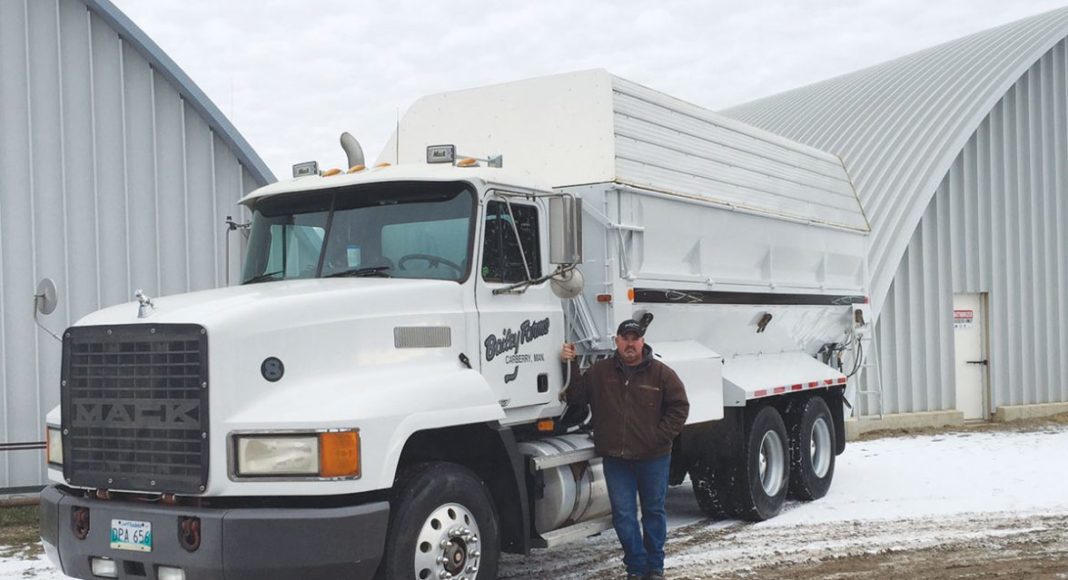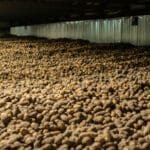When Manitoba potato grower Terry Bailey walks through the frozen food aisle in a supermarket, he sometimes wonders how many of the french fries on display might have originated from his own farm.
He’s been a grower for McCain Foods, the world’s french fry leader, in Carberry, Man. since 2004, when McCain acquired the area’s processing plant from Midwest Food Products. Prior to that, Bailey’s family grew potatoes for Midwest as well. His grandfather started in the potato farming business in 1962.
Like his grandfather and father before him, Bailey grows Russet Burbank potatoes — the Canadian french fry industry’s go-to variety. Growing potatoes to be made into french fries has become a family tradition, and Bailey says it’s that experience that ensures McCain gets a quality product.
“We’re one of the exclusive McCain growers,” Bailey says. “We respect them and they respect what we do.”
Bailey, who’s 46, went into business with his father in 1996, and they were partners up until five years ago when his dad semi-retired. He and his wife Lori are now the sole owners of the business. It’s still a family affair, as his son Thomas and daughter Kelsey — both of whom just graduated from the University of Manitoba with degrees in agriculture — are now involved in running the farm as well.
“We don’t have a large staff. It keeps us hopping all the time during the busy season,” Bailey says. But even at his busiest, modern farming technology means he can get a lot more done in the same amount of time his predecessors could.
“My grandpa had a one-row potato planter and now we run four-row harvesters,” he says. “It’s amazing when you think about it.”
Home to nearly 1,700 people and located 50 kilometres east of Brandon, Man., Carberry is known as ‘King Spud Country’ due to the large number of potato producers in the vicinity.
While it’s great to be part of a large potato-producing community, Bailey says the concentration of growers in the area makes it a challenge to grow his business. He currently farms around 3,000 acres.
“We probably have three or four neighbours who also grow potatoes. The concentration of potato growers in the area is getting heavier. There’s not a lot of new land available, so it’s difficult to expand,” he says.
“We run on a three-year rotation, so we only have a certain number of acres we can grow potatoes on to be on that kind of a rotation. If I could expand, I would, but it’s a huge hurdle. But that’s just the way potato production is in our area right now.”
That said, he also emphasizes that, “Sometimes being bigger isn’t always better.”
According to Bailey, keeping his operation at the size it is now allows him to oversee things closely without needing a larger staff.
“I do keep control of every part of the operation. The kids haven’t been involved very long, and my dad isn’t around all the time. I’m the guy who’s been around here for the last 30 years, so I know everything that’s going on around the farm,” he says.
“Having the next generation around really helps, though. They often understand the technology better than I do. The kids love the computerized pivot panels and the GPS — they can work it with their eyes closed.”
As technology becomes more refined, Bailey sees his yields increasing as well, which is definitely good for the bottom line. Still, it requires an effort to keep on top of a rapidly changing agriculture world.
“We’re 100 per cent irrigated, and with variable rate fertilizing our yields seem to be more consistent, but I rely quite heavily on my agronomist. It’s hard for me to run the business and know every new chemical that comes on the market,” Bailey says. “It gets overwhelming at times. It can be a full-time job keeping up with the technology.”
He adds that having a business partner like McCain helps to ensure he keeps up with technology and that as yields increase, potato quality stays constant and he is always informed about what’s new and exciting in terms of potato varieties.
“McCain is really quality-oriented on the potato side. They sometimes will do a variety test in one of our fields, where we plant different varieties right in the middle of the field,” Bailey says.
“We take pride in what we do. We try to do the best job we can with what we have.”












